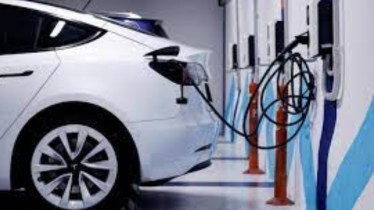By Mitull Batraa CO-Founder and CEO, Udaan
With a constructive policy framework, production-linked incentives, rising investment, and piquing buyers’ interest, India is marching towards becoming a global hub for EV production
Electric vehicles (EVs) are counted among the most sustainable mediums of mobility and by offering totally emission-free transportation, these vehicles are capable of reducing the greenhouse gases in our environment. Like the global scenario, the adoption of EVs is on the rise in India too and to further encourage their widespread adoption, the Indian government is putting special focus on promoting the local manufacturing of EVs. In fact, under the flagship ‘Make in India’ initiative, the government is striving to achieve 100% production of EVs here in India.
Current Scenario
The EV industry in India is still in the stage of infancy although of late, the adoption trend has picked up the pace. Especially when it comes to the 2-wheeler category, an increasing number of people are switching to EVs. In 2022, a total of 1 million EVs were sold in the Indian market and experts predict this to reach 17 million by the end of 2030. Further, estimates suggest that 80% of all the new vehicles sold in the country by 2040 will be electric in nature. Moreover, the target of the Indian Government of achieving 30% electrification of total mobility by 2030 is also expected to push the sales of EVs in the country.
Promoting Local Manufacturing
The intent of the Indian government to establish the country as a manufacturing hub for EVs is clearly evident from a range of schemes rolled out by policymakers at regular intervals of time. The most prominent initiative is the Faster Adoption and Manufacturing of Hybrid and Electric Vehicles in India (FAME) which was launched in the year 2015. The second phase of the scheme was introduced in the year 2019 and under the initiative, attractive incentives are offered to both EV manufacturers and buyers to help boost the entire ecosystem of EVs. The scheme has earmarked a total budget of $1.3Bn and has now been extended until 2024.
We are hoping that the government will again bring in E-Rickshaw in FAME-3 Schemes, as the subsidy is most needed in E-Rickshaws out of all EVs.
Aiding Component Production
Besides encouraging the manufacturing of EVs, incentives are also being offered for companies engaged in the production of EV components in the country. The launch of the production-linked incentive (PLI) scheme in March 2021 is now proving instrumental in the production of EV components such as electric motors, Li-ion Batteries, and chargers among others. The PLI was launched with the aim of attracting investment up to the tune of $2.4Bn and today contributing to creating job opportunities across different EV verticals.
Focus on Charging Infrastructure
One of the primary impediments to the widespread adoption of EVs in India is the lack of charging infrastructure. As of January 2023, the total number of public charging stations in India stood at 5245 catering to a demand of 20.65 lakh EVs in the country. This translates into an EV-to-charger ratio of 393 and in comparison to the global average of 6-20, needless to say that India has to massively work on its charging infrastructure. The government has already announced the setting up of 69,000 charging points and the Department of Heavy Industries (DHI) has already started approving the proposals for setting up public charging points all across the nation.
Tax Exemptions and GST Waiver
In addition to subsidies offered by central and state governments, the Goods and Services Tax (GST) on EVs has been reduced to 5% from a higher tax slab of 12%. Similarly, the GST on chargers/charging stations has also been reduced to 5% from the previous rate of 18%. Hopefully, the Government will reduce GST on Batteries to 5% as well for economic afterservice usage of EVs. Many state governments are also coming forward with complete road tax exemptions to reduce the price of EVs.
In response to the positive and constructive policy framework of the Indian government, many Indian and global conglomerates are investing heavily in the local manufacturing of EVs in India. The good thing is that India is witnessing investment all across the value chain of EVs which ensures that the country will emerge as a hub for EV production in the coming years. The focus of the Indian government to achieve 100% local production of EVs is a very ambitious goal but with support pouring in from all quarters, it is very much achievable within the targets going forward.
Disclaimer: Views expressed are personal and do not reflect the official position or policy of Financial Express Online. Reproducing this content without permission is prohibited.
